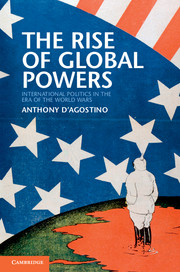Book contents
- Frontmatter
- Contents
- Maps
- Acknowledgements
- Introduction
- 1 The great powers at the dawn of world politics
- 2 Global origins of World War I: from the China scramble to the world crisis of 1904–1906
- 3 Global origins of World War I: a chain of revolutionary events across the world island
- 4 Balance and revolution, 1914–1918
- 5 A ragged peace, 1919
- 6 Scramble for Eurasia, 1919–1922
- 7 Drastic acts of unhappy powers, 1922–1923
- 8 Storms in the lull, 1924–1927
- 9 Politics and economics of the great slump, 1928–1933
- 10 A vogue for national economy
- 11 Mussolini’s moment, 1933–1935
- 12 The global civil war, 1936–1937
- 13 Last years of peace, 1937–1939
- 14 The European war, 1939–1941
- 15 The world war
- 16 Balance and hegemony
- Maps
- Notes
- Index
11 - Mussolini’s moment, 1933–1935
Published online by Cambridge University Press: 05 June 2012
- Frontmatter
- Contents
- Maps
- Acknowledgements
- Introduction
- 1 The great powers at the dawn of world politics
- 2 Global origins of World War I: from the China scramble to the world crisis of 1904–1906
- 3 Global origins of World War I: a chain of revolutionary events across the world island
- 4 Balance and revolution, 1914–1918
- 5 A ragged peace, 1919
- 6 Scramble for Eurasia, 1919–1922
- 7 Drastic acts of unhappy powers, 1922–1923
- 8 Storms in the lull, 1924–1927
- 9 Politics and economics of the great slump, 1928–1933
- 10 A vogue for national economy
- 11 Mussolini’s moment, 1933–1935
- 12 The global civil war, 1936–1937
- 13 Last years of peace, 1937–1939
- 14 The European war, 1939–1941
- 15 The world war
- 16 Balance and hegemony
- Maps
- Notes
- Index
Summary
Hitler’s coming to power in 1933 clearly represents a sea change in the world balance of forces and a crucial point in the story of the coming of World War II. This is the way we see it today. At the time, however, the main effect of the advent of Nazism on the world scene was to give greater freedom to the foreign policy of Mussolini’s Italy, suggesting a possible balance of power, or at least a distraction, among those likely to oppose Italian expansionism. Germany’s own war potential was certainly not such as to create an immediate worry. Hitler himself was reasonably well known, but there was no consensus as to his intentions, still less any general recognition of a blueprint for conquest. Mein Kampf was known in German-language editions, with a one-volume abridgement appearing in London and New York in 1933. Translation into French came only in 1934. Dozens of other translations were to appear in following years. Karl Radek, the leading Soviet expert on Germany, told Louis Fischer that he and his associates translated many passages for Stalin, along with all of Hitler’s speeches. Stalin read them carefully. The British Foreign Office summarized Mein Kampf in an eleven-page memo to Prime Minister Ramsey MacDonald, with a note appended by the Oxford historian E. L. Woodward. There was at least some recognition of the outlines of Hitler’s expansionist ideas, his lust for lands in the Soviet Union, his aim to win by diplomacy the adhesion of Britain and Italy to his plans. Aside from Robert Vansittart and his circle in the Foreign Office, most British politicians did not study the text nor consider it crucial until after the Munich Conference that divided Czechoslovakia for German benefit in 1938.
In France the story was similar. The ambassadors were much more alarmed by Nazism than the Parisian press. The leading authority on Germany and Nazism, André François-Poncet, the ambassador in Berlin, had followed Hitler’s path to power through its ups and downs in 1932–3. He regarded Hitler’s victory as that of a “Nietzschean despotism” according to the nineteenth-century racial doctrines of Arthur de Gobineau and Houston Stewart Chamberlain. François-Poncet noted that England had been Hitler’s bête noire in 1921 but that now the “country of Lord Rothermere” (for a time, Oswald Mosley’s supporter) was preferred by Hitler over fellow reactionaries like Horthy or Mussolini. Hitler had been an Italophile in 1923 at the time of the Beer Hall Putsch and had renounced German claims in the South Tyrol in order to placate the Italians. French reactions were echoed in the White House. Roosevelt was said to have read Mein Kampf in the original German, with which he had some facility, to the extent of complaining about the translations. He told the French ambassador that “The situation in Europe is alarming. Hitler is a madman and his advisors, some of whom I know personally, are more so than he . . . France cannot disarm now and no one will demand it of her.”
- Type
- Chapter
- Information
- The Rise of Global PowersInternational Politics in the Era of the World Wars, pp. 268 - 305Publisher: Cambridge University PressPrint publication year: 2011



